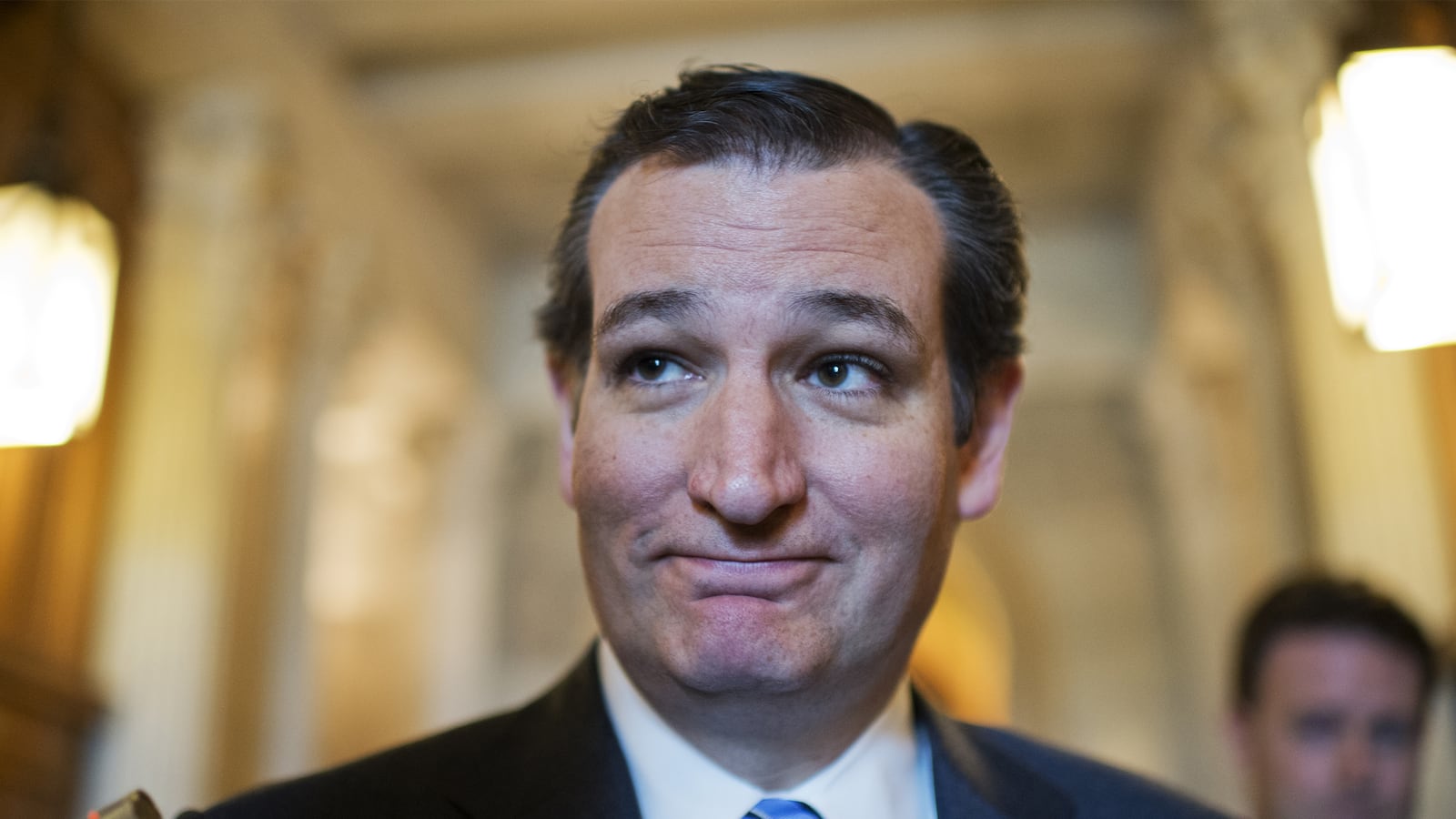Congratulations, Mitch McConnell! You now have the hardest job in Washington.
That dubious distinction used to belong to belong to House Speaker John Boehner, who has struggled since 2011 to manage a GOP majority so unwieldy he called it everything from “frogs in a wheelbarrow” to the “knucklehead” caucus. But as the incoming Senate majority leader, it will now fall to McConnell to receive legislation from the House, shepherd it past his 53-member majority, and deliver completed bills to the president, all while keeping the government open for business.
McConnell’s difficult job will be made enormously more complicated by the makeup of his incoming three-seat majority. It includes at least three senators eyeing a run for president (Ted Cruz, Marco Rubio, and Rand Paul), and 11 new Republican members, three of whom have been pegged by grassroots activists as the conservative cavalry riding in as reinforcements for the Cruz wing of the party. Those senators—Joni Ernst of Iowa, Tom Cotton of Arkansas, and Ben Sasse from Nebraska—were all breakout stars for activists in the 2014 cycle. They raked in millions of dollars from outside groups like the Senate Conservatives Fund, and are the three that conservatives like Steve Deace, the nationally syndicated conservative radio host from Iowa, say they expect the most from.
“What I heard from conservatives I talked to around the country during the election was ‘Who is going to go there and help out Cruz and [Sen. Mike] Lee? Who is going to help out the wacko birds?’” said Deace, referring to the derisive term Sen. John McCain once used to describe Cruz that conservatives now wear as a badge of honor. “Our expectation is that [Ernst, Cotton and Sasse] are going to join the ranks of the wacko birds. That’s our expectation.”
Deace and his listeners won’t be the only ones looking to the trio to for results. So will conservative donors. The Senate Conservatives Fund and its affiliate Senate Conservatives Action, for example, plowed millions into the Iowa, Nebraska and Arkansas races. Ernst received nearly $450,000 in bundled contributions and $475,000 in independent expenditures from the groups for her race. Sasse got $487,000 in bundled contributions and more than $835,000 in outside expenditures in his GOP primary. Cotton picked up about $200,000 in bundled SCF money and saw more than $500,000 in outside SCF money in his race against Democratic Sen. Mark Pryor.
Another major conservative group, Club for Growth Action, poured more than $800,000 into Cotton’s race against Pryor, about $500,000 against Sasse’s primary opponents, and another $297,151 and $186,587 in bundled donations for Cotton and Sasse, respectively.
The first place conservatives will look to the new freshmen to make their voices heard is on immigration, which Ernst and SCF both call “executive amnesty.” The president has indicated he’ll soon take sweeping unilateral action, a move McConnell said won’t draw him into a government shutdown fight when he takes over the majority.
“There won’t be a government shutdown,” McConnell pledged Thursday, a commitment that left conservatives livid.
“Mitch McConnell is making promises he can’t keep,” Deace said. “Whatever enjoyment McConnell got out of being elected leader, enjoy it. Because from this point forward, power is going to be leaving his hands.”
Jim Manley, a former top aide to Senate Majority Leader Harry Reid, predicted that McConnell and the Republicans will safely navigate the lame-duck session, but once the new senators are sworn in, “All bets are off.”
“Sen. McConnell has got a whole bunch of people in his caucus, including those up in 2016, who realize the current strategy [of obstruction] is not going to work, and they need to put some legislative points on the scoreboard,” Manley said. “But whether that’s going to play out remains to be seen, in part because there are three Republicans running for president, none of whom care much about the Senate as an institution nor about their other colleagues’ views, quite frankly. And there are a handful of incoming senators who are very, very conservative.”
But Ron Bonjean, who was a senior staffer to Sen. Trent Lott when he was majority leader, said McConnell not only will have to consider the instincts of conservatives during those votes, but also the needs of several Republicans like Pat Toomey, who is up for reelection in 2016 the blue state of Pennsylvania.
“I do think McConnell knows how to manage his caucus,” Bonjean said. “While there will definitely be turbulence because he has more members to deal with, there are also some other dynamics at play for some of these members.”
Bonjean predicted that like Boehner, McConnell will need to have a majority of his majority on board to get a bill to the floor, but also will have to make the bills bipartisan enough to avoid a Democratic filibuster.
“Here’s the problem: Even if McConnell has all 53 Republicans, he’s got to get to 60 votes,” Bonjean said. “That’s very difficult to do, so they’re going to have to go for bipartisan victories to begin with, low-hanging fruit that can move through the Senate to show that they can get the work done.”
But low-hanging, bipartisan bills are exactly what Cruz and the grassroots conservatives backing Ernst, Sasse, and Cotton say they don’t want, especially in the face of an Obama executive order.
“I took an hour of calls yesterday asking what Congress should do if the president acts alone on immigration,” Deace said. “Every call, all over the country, men and women, all said the same thing: Impeach him.”





